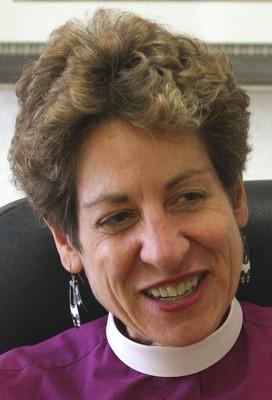Episcopal leader gives views of global warming’s impact

WASHINGTON — Katharine Jefferts Schori, a former bishop from Nevada who now leads the Episcopal Church in the United States, cast the debate over climate change in moral terms on Thursday.
Jefferts Schori said at a Senate hearing that inaction on global warming most threatens people in poverty and native cultures that don’t have the ability to adapt.
Jefferts Schori was an oceanographer at Oregon State University before being ordained into priesthood.
She served as bishop of the Episcopal Diocese of Nevada before being installed as the church’s presiding bishop in November.
"As one who has been formed through deep faith and as a scientist, I believe science has revealed to us without equivocation that global warming and climate change are real," she said. "They are a threat to God’s creation and all of humanity."
Seven Christian and Jewish religious leaders were invited to talk about global warming and the poor at a hearing called by the Sen. Barbara Boxer, D-Calif., chairwoman of the Senate Environment and Public Works Committee.
"These people of faith strive for justice," Boxer said. "They recognize that our best scientists say that global warming’s impact will fall most heavily on poor people around the world."
Boxer is proposing legislation with Sen. Bernie Sanders, D-Vt., that would require U.S. greenhouse gas emissions reduced by 80 percent by 2050.
Some of the religious leaders were believers in the need to address climate change. Others were skeptical.
Jefferts Schori noted the aftermath of Hurricanes Katrina and Rita displaced thousands of low-income residents.
She said changing rain patterns will disrupt agriculture in Africa, "leaving populations without food and hamstrung in their ability to trade internationally to generate income."
John Carr, an advocate for the U.S. Catholic Bishops Conference, declared himself a "convert" to climate change science.
"We should look at climate change from the bottom up," he said. "The real inconvenient truth is those who contribute least to climate change will be affected most."
However, Jim Tonkowich, president of the Institute on Religion and Democracy, a Washington think tank, said, "Scientific consensus has been wrong in the past, and scientific consensus will be wrong again."
"Thank God for the skeptics," Tonkowich said.
Russell Moore, a dean at the Southern Baptist Theological Seminary, said he doubted the "apocalyptic" scenarios predicted by the "secularist environmental movement."
He said global warming is presented as if there is "an indisputable consensus," adding he did not think there is such agreement.
Moore was challenged by Boxer, who raised her voice.
"Well, sir, there were scientists who said the world was flat and there were scientists who said HIV doesn’t cause AIDS," Boxer said.
Sen. James Inhofe, R-Okla., said legislation to cap carbon emissions would do more to hurt the poor by increasing the cost of energy.
"I cannot support measures that unfairly target the poor," added Sen. Christopher Bond, R-Mo.
Jefferts Schori said skeptics should reconsider their views. She closed her testimony by quoting the Book of Proverbs: " ‘Where there is no vision, the people perish,’ " she said.












